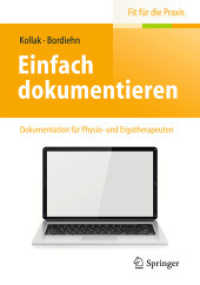- ホーム
- > 洋書
- > 英文書
- > Business / Economics
Full Description
"End poverty in all its forms everywhere" - UN Sustainable Development Goal 1There has never been a more urgent need to tackle the issue of global poverty, and the need for businesses, business schools and management programmes to address the issue is crucial as they educate and employ the leaders of tomorrow.But with so many competing priorities on courses and considerable ground to cover, it can be challenge to devote enough time and attention to poverty issues.Responsible Management Education and the Challenge of Poverty provides an invaluable guide for management educators who want to inspire a new generation of leaders to tackle global poverty challenges. This expert collection shows educators how to teach poverty in management programmes, with examples, encouragement and guidance from course leaders and management academics.The five sections of the book focus on frameworks for understanding, course design and topic integration within courses, extra-curricular approaches or community-based approaches, contemporary issues and future directions.The book is a companion volume to Socially Responsive Organizations and the Challenge of Poverty, which shows a clear rationale for the inclusion of poverty in management education.Showcasing innovative teaching, module development and program design methods that integrate the issue of poverty into global business management courses and curricula, this handbook shows educators how to design effective programmes and modules that get to the heart of poverty issues as they relate to management education. It is essential reading for faculty members, trainers and administrators who are interested in new ways to engage students with the complex relationship between poverty and business practice.
Contents
IntroductionSection 1: Frameworks for understanding 1. Realizing the promise of experiential learning in poverty-related management education Sheldene Simola, Trent University, Canada2. Explication as a method to access and enhance practitioner and faculty learning Val Lowman, OBE, Lendlease Be Onsite, UK3. Innovative inclusive development strategies: lessons from the Philippines Andrea Santiago, De La Salle University, The Philippines Fernando Roxas, Graduate School of Business, Asian Institute of Management, The Philippines4. Management education with poverty alleviation focus: a framework for curriculum design and pedagogical alignment Shiv K. Tripathi, Mzumbe University, TanzaniaAjai Prakash, University of Lucknow, IndiaWolfgang Amann, HEC Paris, FranceSection 2: Course design and topic integration within courses 615. Teaching about the base of the pyramid: bringing students to the intersection of business and poverty alleviation Ted London, William Davidson Institute and Ross School of Business, University of Michigan, USA6. Strategies for the integration of poverty alleviation into management curriculum: poverty - how can business help? Geri Mason, School of Business, Government, and Economics, Seattle Pacific University7. Poverty in a marketing class? Saroja Subrahmanyan, Elfenworks Center for Responsible Business, Saint Mary's College of California, USA J. Tomas Gomez-Arias, Saint Mary's College of California, USA8. A new vocabulary for teaching poverty in marketing Paulo Cesar Motta, Pontifical Catholic University of Rio de Janeiro, Brazil Thomas Brashear Alejandro, University of Massachusetts Amherst, USA9. Educating young leaders for alleviating poverty through an organizational behaviour course Claudio Andres Rivera, Riga Business School, Latvia10. Simmons World Challenge: a case study in grounding management education in global poverty Mindell Reiss Nitkin, Simmons College, USAMary Shapiro, Simmons College, USASection 3: Extracurricular and community-based approaches11. Ethics to reduce poverty: the case of the "100 Youths for Ethics in Development" programme in Argentina Maria Laura Fiorotto, UNDP, Bolivia12. Challenges and opportunities for student engagement in university social projects in the current socioeconomic context of Russia Oleg Vikhanskiy, Lomonosov Moscow State University Business School, Russia Elena Kiseleva, Lomonosov Moscow State University Business School, Russia Natalia Churkina, Lomonosov Moscow State University Business School, Russia13. The impact of university social services through social incubation and student engagement in poverty alleviation Luis Portales, Universidad de Monterrey, MexicoConsuelo García de la Torre, EGADE Business School, Tecnológico de Monterrey, Mexico14. A case study of community learning and open innovation to reduce poverty at the base of the pyramid Lutz E. Schlange, University of Applied Sciences, Eastern SwitzerlandSection 4: Contemporary issues15. Financial exclusion: technology, the digital divide and poverty Daniel R. Horne, School of Business, Providence College, USA16. The importance of responsible public management in addressing the challenge of poverty: the need for socially responsible public management Athanasios Chymis, Centre of Planning and Economic Research (KEPE), Greece Massimiliano Di Bitetto, Italian National Research Council (CNR) Paolo D'Anselmi, University of Rome, Tor Vergata, Italy Antonis Skouloudis, Centre for Environmental Policy and Strategic Environmental Management, University of the Aegean, GreeceConclusion: Taking stock and moving towards the next stepsAbout the editorsAbout the contributors







